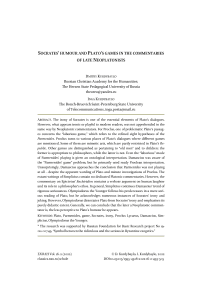Socrates’ humour and Plato’s games in the commentaries of late Neoplatonists
Автор: Dmitry Kurdybaylo, Inga Kurdybaylo
Журнал: Schole. Философское антиковедение и классическая традиция @classics-nsu-schole
Рубрика: Статьи
Статья в выпуске: 2 т.16, 2022 года.
Бесплатный доступ
The irony of Socrates is one of the essential elements of Plato’s dialogues. However, what appears ironic or playful to modern readers, was not apprehended in the same way by Neoplatonic commentators. For Proclus, one of problematic Plato’s passages concerns the “laborious game,” which refers to the refined eight hypotheses of the Parmenides. Proclus turns to various places of Plato’s dialogues where different games are mentioned. Some of them are mimetic arts, which are partly restricted in Plato’s Republic. Other games are distinguished as pertaining to “old men” and to children: the former is appropriate to philosophers, while the latter is not. Even the “laborious” mode of Parmenides’ playing is given an ontological interpretation. Damascius was aware of the “Parmenides’ game” problem, but he primarily used ready Proclean interpretation. Unsurprisingly, Damascius approaches the conclusion that Parmenides was not playing at all — despite the apparent wording of Plato and minute investigations of Proclus. The extant writings of Simplicius contain no dedicated Platonic commentaries. However, the commentary on Epictetus’ Enchiridion contains a verbose argument on human laughter and its role in a philosopher’s ethos. In general, Simplicius continues Damascius’ trend of rigorous seriousness. Olympiodorus the Younger follows his predecessors in a mere serious reading of Plato, but he acknowledges numerous instances of Socrates’ irony and joking. However, Olympiodorus dissociates Plato from Socrates’ irony and emphasises its purely didactic extent. Generally, we can conclude that the later a Neoplatonic commentator is, the less perceptive to Plato’s humour he appears.
Plato, Parmenides, game, Socrates, irony, Proclus Lycaeus, Damascius, Simplicius, Olympiodorus the Younger
Короткий адрес: https://sciup.org/147237647
IDR: 147237647 | DOI: 10.25205/1995-4328-2022-16-2-493-505
Список литературы Socrates’ humour and Plato’s games in the commentaries of late Neoplatonists
- Ahbel-Rappe, S., ed. (2010) Damascius’ Problems and Solutions Concerning First Principles. Oxford: Oxford University Press.
- Allen, R. E., ed. (1997) Plato’s Parmenides. New Haven, London: Yale University Press.
- Athanassiadi, P., ed. (1999) Damascius. The Philosophical History. Athens: Apamea.
- Baltussen, H. (2008) Philosophy and Exegesis in Simplicius: The Methodology of a Commentator. London, New York: Bloomsbury.
- Baltzly, D., ed. (2007) Commentary on Plato’s Timaeus, vol. 3, book 3, pt. 1: Proclus on the World’s Body. Cambridge: Cambridge University Press.
- Brennan, T., Brittain, Ch., eds. (2002) Simplicius. On Epictetus Handbook 27-53. London, New York: Bloomsbury.
- Bury, R. G., ed. (1926) Plato with an English translation. Pt. X. Laws, vol. II. London: William Heinemann; New York: G. P. Putnam’s Sons.
- Bury, R. G., ed. (1961) Plato with an English translation. Pt. IX. Laws, vol. I. Cambridge: Harvard University Press; London: William Heinemann.
- Cooper, J. M., ed. (1997) Plato. Complete works. Indianapolis, Cambridge: Hackett publishing company.
- Cousin, V., ed. (1961) Procli philosophi Platonici opera inedita, pt. 3. Hildesheim: Olms.
- Dillon, J. M., Morrow, G. R. (1987) Proclus’ Commentary on Plato’s Parmenides. Princeton: Princeton University Press.
- Dübner, F., ed. (1842) Theophrasti characteres. Paris: Didot.
- Griffin, M., ed. (2015) Olympiodorus. Life of Plato and On Plato First Alcibiades 1–9. London, New York: Bloomsbury.
- Halliwell, S. (2008) Greek Laughter: A Study of Classical Psychology from Homer to Early Christianity. Cambridge: Cambridge University Press.
- Heath, M. (2019) “Divine and Human Laughter in Later Platonism,” in: P. Destrée and F. V. Trivigno, eds. Laughter, Humor, and Comedy in Ancient Philosophy. New York: Oxford University Press, 80–100.
- Jackson, R., Lycos, K., Tarrant, H., eds. (1998) Olympiodorus. Commentary on Plato’s Gorgias. Leiden, Boston, Köln: Brill.
- Kurdybaylo, D., Kurdybaylo, I. (2021) “Playing and laughing gods of Plato’s dialogues in the commentaries of Proclus,” ΣΧΟΛΗ (Schole) 15.1, 53–63.
- Majercik, R., ed. (1989) The Chaldean Oracles. Leiden, New York: Brill.
- Radke, G. (2006) Das Lächeln des Parmenides: Proklos’ Interpretationen zur platonischen Dialogform. Berlin: de Gruyter.
- Schenkl, H., ed. (1916) Epicteti dissertationes ab Arriano digestae. Leipzig: Teubner.
- Tanner, S. M. (2017) Plato’s Laughter: Socrates as Satyr and Comical Hero. Albany: SUNY Press.
- Taylor, Th., tr. (1995) Proclus, The Theology of Plato. Frome: The Prometheus Trust.
- Westerink, L. G., Combès, J., eds. (1991) Damascius. Traité des premiers principes. Tome III: De la procession de l’unifié. Paris: Les Belles Lettres.
- Westerink, L. G., ed. (1956) Olympiodorus. Commentary on the first Alcibiades of Plato. Amsterdam: Hakkert.
- Westerink, L. G., ed. (1959) Damascius, Lectures on the Philebus, wrongly attributed to Olympiodorus. Amsterdam: North-Holland Publishing Company.
- Zintzen, C., ed. (1967) Damascii vitae Isidori reliquiae. Hildesheim: Olms.


